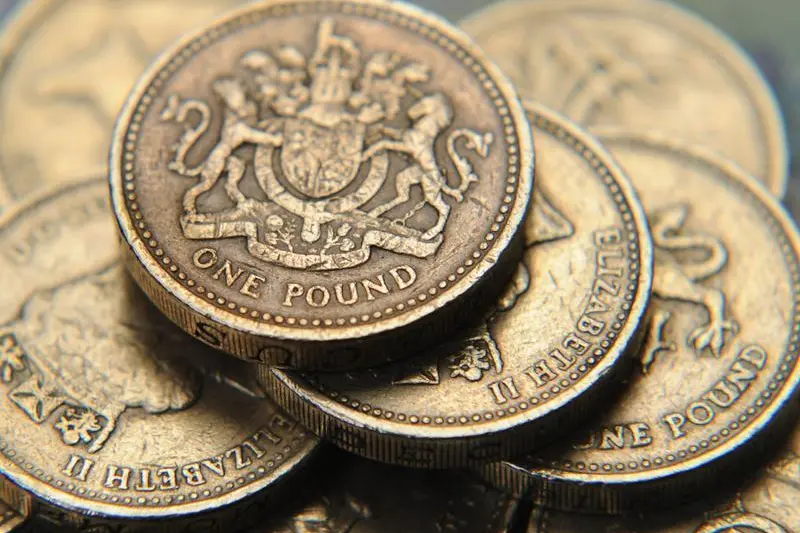PHOTO
LONDON - Sterling hit its lowest levels since January against the dollar on Wednesday as concern about soaring natural gas prices and almost a week of petrol shortages outweighed a recovery in global equity markets.
The pound generally trades in line with global risk sentiment, and as such, is sensitive to the performance of global equity markets. Tuesday's global equity selloff came as investors braced for future rate hikes from global central banks, most notably the U.S. Federal Reserve.
Although stocks staged a recovery on Wednesday, sterling extended its Tuesday losses and fell 0.2% more to its lowest since Jan. 11 against the dollar at $1.35045. GBP=D3
It traded about flat against the euro near a two-month low of 86.40 pence per euro.
“The GBP bears are in charge of the FX price action at the moment,” said Valentin Marinov, head of G10 FX research at Credit Agricole.
“Investors fret about the looming stagflation risks ahead that could scupper the UK economic recovery and force the (Bank of England's Monetary Policy Committee) MPC to reconsider its plans for policy normalisation. In turn, a less proactive BoE could result in even more negative UK rates and gilt yields.”
Bank of England governor Andrew Bailey is scheduled to speak at a forum in Sintra, Portugal later on Wednesday.
British 10-year gilt yields also rose to the highest since the pandemic started above 1%, on Tuesday.
"Gilts underperformed U.S. Treasuries and Bunds this month. It's a warning sign that markets are getting more concerned about the growth and inflation outlook for the UK," said Kenneth Broux, strategist at Societe Generale.
"We had Bailey twice in the past 4 days warning the BoE could raise rates before the end of QE which puts markets on notice they are looking at it seriously. We will see more nasty inflation numbers and it will make for interesting discussions at MPC (Monetary Policy Committee) meetings in November and December.
A key gauge of the financial market's expectations for inflation in Britain over the coming years, watched closely by the Bank of England, rose on Tuesday to its highest level in at least eight years, as gilt yields surged.
The five-year, five-year forward inflation-linked swap - a proxy for inflation expectations over the next five years - rose to 3.905%, the highest since daily records published by Refinitiv began in 2013, and up from 3.878% on Monday.
The move reflects a growing conviction among investors that rising inflation in Britain will not prove to be as transitory as the BoE hopes, with recent supply chain problems escalating into a full-blown crisis over the last week.
FUEL SHORTAGES
A post-Brexit shortage of lorry drivers as the COVID-19 pandemic eases has sown chaos through British supply chains in everything from food to fuel, raising the spectre of disruptions and price rises in the run-up to Christmas.
Drivers have been panic-buying fuel for almost a week, leaving pumps dry across major cities, after oil companies warned they did not have enough truck drivers to move petrol and diesel from refineries to filling stations.
"Whilst we concede that rising domestic fuel prices are a headwind to the UK consumer, we do not think that recent developments are existential enough to weigh on GBP as it has done," said Kamal Sharma, FX strategist at BoFA Global Research.
"Indeed, through both the NY and Asia session, we observe that GBP was relatively stable - we would have expected a continuation of selling pressure if the narrative was one of fundamental deterioration in the UK economy. More likely, we think that GBP has succumbed to month/quarter end rebalancing pressures as it has done in Q1 and Q2."
Jordan Rochester and George Buckley at Nomura said extreme price action in the pound is not much of a surprise.
"Gas prices are moving in an extreme manner, so why not in FX too The concern for macro investors is if GBP becomes a market that will become truly unpredictable," they wrote in a note to clients.
"Perhaps the UK suffers from continuous headline shock risks, as it used to in the Brexit politically driven GBP era (2016-2019), which was a time when many macro investors looked elsewhere for more thematic-driven trades. It’s something we don’t expect to happen for a considerable amount of time but a risk on days like this we can’t ignore."
(Reporting by Ritvik Carvalho; editing by Philippa Fletcher) ((Ritvik.Carvalho@thomsonreuters.com; +44 2075429406; Reuters Messaging: ritvik.carvalho.thomsonreuters@reuters.net; Twitter @ritvikcarvalho))





















